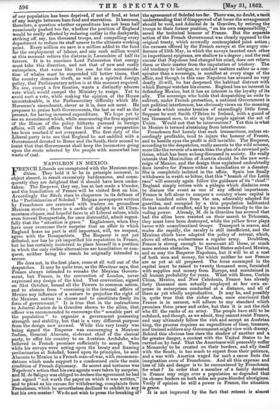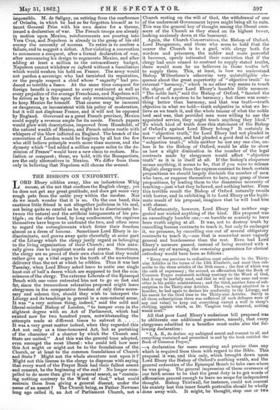NAPOLEON IN MEXICO. F RENCH Liberals are enraptured with the Mexican
expe- dition. They hold it to be in principle immoral, in object absurd, in result excessively burdensome, and conse- quently they are delighted that it should have been under- taken. The Emperor, they say, has at last made a blunder, and the humiliation of France will be visited first on him. Accordingly. the Siècle rises to eloquence in its defence of the " Preliminaries of Soledad." Belgian newspapers written by Frenchmen are crammed with leaders on groundless Mexican stories ; there is a cackle of delight in all Ultra- montane cliques, and hopeful faces in all Liberal salons, while even fervent Bonapartists, for once distrustful, admit regret- fully that the "situation is grave." Englishmen, when they have once overcome their surprise that an affair in which England bears no part is still important, will, we suspect, agree with the Bonapartists. The Emperor is not yet defeated, nor has he yet imperilled his reputation in France, but he has certainly contrived to place himself in a position in which the only visible alternatives are humiliation or con- quest, neither being the result he originally intended to .-secure.
He does not, in the first place, come at all well out of the despatches. It may be quite true, as the Moniteur says, that France always intended to remake the Mexican Govern- ment, but France, in the convention of London, never expressed any design of the kind. That convention, signed on 31st October, bound all the Powers to common action, and to abstain from " exercising in the internal affairs of Mexico any influence of a nature to prejudice the right of the Mexican nation to choose and to constitute freely its form of government." It is true that in the instructions to Admiral Jurien de la Gravure shown to the allies, that officer was recommended to encourage the " sensible part of the population " to organize a government possessing strength and stability, but that is a very different purpose from the design now avowed. While this very treaty was being signed the Emperor was encouraging a Mexican Indian, General A hnonte, ci-devant chief of the clerical party, to offer his country to an Austrian Archduke, who believed in French promises sufficiently to accept. Then while his envoys were acting upon the treaty and framing preliminaries at Soledad, based upon its principles, he sent Almonte to Mexico in a French man-of-war, with recommen- dations which made support to a condemned exile the main Condition of French diplomacy. So secret and tortuous was Napoleon's action that his own agents were taken by surprise, and M. de Saligny was obliged to declare the agreement he had just signed " not worth the paper on which it was written," and to plead as his excuse for withdrawing, complaints from Frenchmen, which he nevertheless declined to exhibit to any but his own master ! We do not wish to press the breaking of the agreement of Soledad too far. There was, no doubt, a tack understanding that if disapproved of at home the arrangement should be void, and Admiral de In Gmviere, by retirmg the troops to their former position, "on his own responsibility," saved the technical honour of France. But the separate action of the French Government was clearly opposed to the original treaty, which avowedly contemplated joint action ; the excuses offered by the French envoys at the angry con- ference of 15th May, in which the envoys taunted each other in impertinent epigrams, are shallow to a degree ; and the real excuse that Napoleon had changed his mind, does not relieve them or their master from the imputation of trickery. The old tendency to intrigue, to conduct matters rather as a con- spirator than a sovereign, is manifest at every stage of the affair, and though in this case Napoleon has aroused no very deadly he has deepened the habitual distrust with which Europe watches his course. England has no interest in defending Mexico, but it has an interest in the loyalty of its ally. The sovereign who holds that despatching an exile to subvert, under French protection, a national Government is not political interference, has obviously views on the meaning of words which render treaties of exceedingly little force. Suppose he sent Smith O'Brien to Ireland, with a guard of ten thousand men, to stir up the people against the act of Union. Would not that be intervention ? Yet this is what in Mexico is termed abstaining from interference. Frenchmen feel keenly that such transactions, unless ex- ceedingly profitable, tend to injure the honour of France, and to hostile eyes the profit is still invisible. The Emperor, according to the despatches, really assents to the wild scheme, more like the reverie of a savan than the plan of a crowned poli- tician, which has been so long discussed in society. He really intends that Maximilian of Austria should be the new sove- reign of Mexico, and the design thus explained undoubtedly does involve for France either a humiliation or a disaster. She is completely isolated in the affair. Spain has finally withdrawn in wrath so bitter, that this "branch of the Latin race" will scarcely again follow the guidance of its "chief." England simply retires with a phlegm which disdains even to discuss the event as one of any official importance. France is left alone to conquer a country whose capital is three hundred miles from the sea, admirably adapted for guerillas, and occupied by a thin population habituated to that mode of conflict, and by no means friendly to the in- vading power. Already, M. de la Graviere has avowed that had the allies been resisted on their march to Tehuacan, they must have been destroyed, while the yellow fever plays havoc with unacclimatized troops. Transport is scarce, and mules die rapidly, the cavalry is still insufficient, and the Mexican chiefs have adopted the policy of retreat, which, above all others, embarrasses a regular army. Doubtless, France is strong enough to surmount all these, or much more serious obstacles. The United States subdued Mexico, and so may the Emperor Napoleon, but it will be at a cost of both men and money, for which neither he nor France are as yet at all prepared. The force encamped in the capital must be raised to twenty thousand men, furnished with supplies and money from Europe, and maintained in all human probability for years. What with Rome, Cochin China, Mexico, and New Caledonia, France has already forty thousand men actually employed at her own ex- pense in enterprises conducted at a distance, and all of them as yet wholly unproductive. It may be, and possibly is, quite true that the richer class, once convinced that France is in earnest, will adhere to any standard which promises them peace and order, but then it is not the rich who fill the ranks of an army. The people have still to be subdued, and though, as we admit, they cannot resist France, and may ultimately follow the rich and accept an Austrian king, the process requires an expenditure of time, treasure, and trained soldiers any Government might view with dismay. Behind this obvious loss rises the shadow of another and a far greater danger, a contest with the United States to be carried on by land. That the Americans will peaceably suffer a Monarchy to be created on their borders, and ally itself with the South, is too much to expect from their patience, and a war with America waged for such a cause frets the imagination even of Frenchmen. And all this expense and loss of life and danger is to be encountered by Frenchmen for what ? In order that a member of a family detested in France may reign over a population so degraded that its chosen leaders on both sides are pure-blooded aborigines, Verily if opinion be still a power in France, the situation is grave. It is not improved by the fact that retreat is almost impossible. M. de Saligny, on retiring from the conference of Orizaba, in which he had so far forgotten himself as to taunt General Prim with his own desire for a throne, issued a declaration of war. The French troops are already in motion upon Mexico, reinforcements are pouring into Vera Cruz, and Napoleon is already in the grasp of his old enemy the necessity of success. To retire is to confess a failure, and to suggest a defeat. After violating a convention to commence a conquest, after a formal declaration of war, after announcing his design to regenerate Mexico, and after adding at least a million to the extraordinary budget, Napoleon cannot withdraw re infect% without a humiliation which would weaken his hold on France. The army would not pardon a sovereign who had tarnished its reputation, or the people respect a chief whose " sagacity" had pro- duced so terrible a fiasco. At the same time conquest for foreign benefit is repugnant to every sentiment as well as every prejudice of the average Frenchman, and Napoleon will be driven as by a fate upon the only remaining alternative, to keep Mexico for himself. That course may be immoral or dangerous, or inconsistent with his policy of moderation, but it will not displease France, and it will not be opposed by England. Governed as a great French province, Mexico could supply a revenue ample for its needs. French papers would glow with descriptions, improved from Humboldt, of the natural wealth of Mexico, and French salons rustle with whispers of the blow inflicted on England. The breach of the convention of London would be forgiven by all but the few who still believe principle worth more than success, and the dynasty which " had added a million square miles to the do- minion of France" would have a new claim to endure. Hu- liation or conquest ; these, we hold, with the Bonapartists, are the only alternatives in Mexico. We differ from them only in believing that Napoleon will choose the second.































 Previous page
Previous page